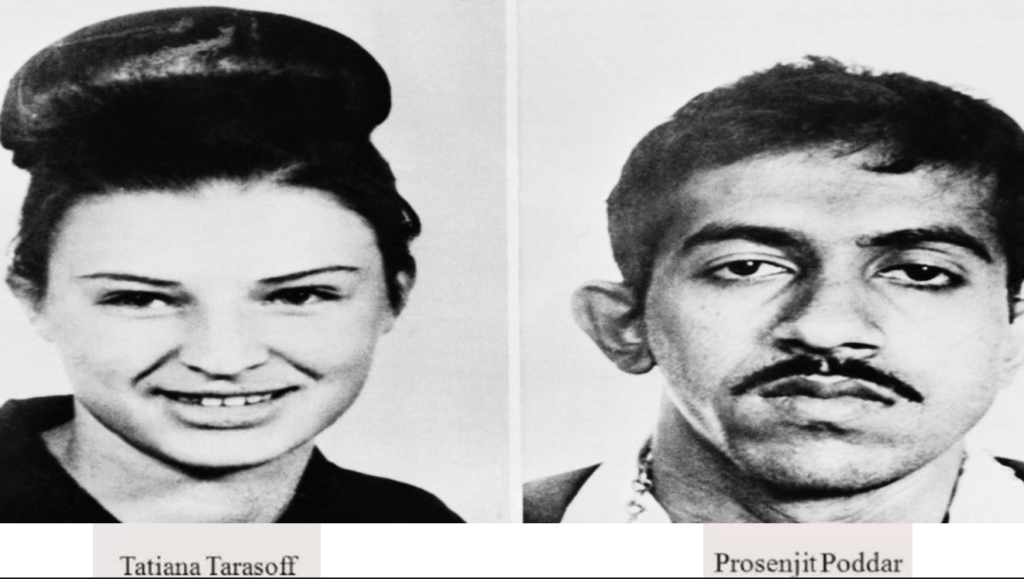
| Citation | 17 Cal. 3d 425, 551 P.2d 334, 131 Cal. Rptr. 14. |
| Date of Judgment | July,1976. |
| Court | Supreme Court Of Califorina. |
| Case Type | Psychologists have a right of ‘duty to protect’ if any individual is at risk from their client’s future action. |
| Appellant | Vitali Tarasoff. |
| Respondent | Regents of university of California |
| Bench | Donald Wrigh, Raymond L. Sullivan, Marshall F. McComb, Matthew O. Tobriner, William P. Clark, Jr.Stanley, Frank K. Richardson. |
| Referred | Law referring in califorina. |
FACTS OF THE CASE
In 1969, Prosenjit Poddar who was a college student at the University of California, Berkley started eying a girl name Tatiana Tarasoff at his dance classes. She was a beautiful and young Russian woman, later when the conversation between two became more regular they started dating each other.
After sometime their relationship started dissolving and Tarasoff rejected him in favour of other man, Poddar was not able to overcome his past and started self-doubting, he developed anger issues and became extremely depressed. He then decided to take therapy from Lawrence Moore, a psychologist at Berkeley’s Cowell Memorial Hospital. during his seventh and final treatment session, Poddar discussed his intention to harm an unidentified female. Although the intended victim was not named directly, Tarasoff was easily identified by Ms. Moore.
Dr. Moore after listening concerned for the safety of Tarasoff, wrote to the campus police regarding the safety of Tarasoff also to have Poddar detained by campus she added that he was suffering from an acute episode of paranoid schizophrenia. Poddar was then detained by the campus police and was held to an intense interview after which he was released as he answered all the questions accordingly.
He was then warned to stay away from Tarasoff and hence no further action was taken against him considering that he won’t cause any harm to Tarasoff. After his release, Dr. Harvey Powelson, medical ordered the destruction of all notes taken by Dr. Moore as well as the returns of all letters from the police. Tarasoff including her parents were not informed or warned of the threat.
Poddar did not return to therapy after release. He instead began stalking Tarasoff again also befriended Tarasoff’s brother and moved in with him. Several weeks later, on October 27, 1969, Poddar attacked Tarasoff shot her with a gun and stabbed her to death with the help of a kitchen knife. After this incident, Tarasoff’s parents sued Dr Moore including the whole university, stating that they should have been warned of the threat to their daughter before this incident.
Poddar was found guilty as a charge of second-degree murder and was sentenced to five years of jail. In 1974, the Supreme Court ruled that mental health professionals do have a duty to warn, though a strong dissent from Justice Clark argued that a duty to warn compromised the confidentiality of psychotherapy of the patient and that clients might not seek treatment if they knew that their stories might be shared with third parties.
ISSUES
Does defendants owe a duty to victim thus making them liable for the injury caused to the plaintiff?
ARGUMENTS
Tatiana’s parents filled case against Dr. Moore and also including all the regents of university for not informing/warning about Poddar being dangerous to the life of their daughter. The plaintiffs further argued that Dr. Moore failed to provide adequate follow up care with Poddar to ensure he was not a danger to himself nor the public.
Dr. Moore argued that being a professional therapist he was not having any right to provide his client’s information to any third party this will constitute to the act of breach of trust, further he argues mental health providers cannot with certainty predict the likelihood that a patient with act on threats of violence.
JUDGEMENT
The first two courts concluded that ruled that the Tarasoff’s did not have a valid cause of action, since there was no duty of care placed on the University employees for Poddar’s behaviour. They ruled that there was no legal duty to act in order to avoid someone else’s harmful behaviour. Then further ruling by the supreme court provided that there must be a balance between the information provided by the client to his/her therapist. If the psychotherapists feel that the intentions of their patient may lead to some serious injury to someone, then they can provide this information under ‘duty to protect’ which means that they are only providing their client’s information to protect any kind of mishap from his patient mental condition.
In the context of Tarasoff’s case when a health care provider (Dr Moore) has direct or indirect knowledge of information that a reasonable individual may determine that a patient may harm himself or others, this provider must exercise reasonable and prudent judgement to prevent harm. The court in California ruled that mental health professionals have an obligation to both the patient and individuals who are threatened by a patient.
It also became evident, following the Tarasoff decision, that therapists must carefully consider threats relayed to them by relatives of a person in therapy, as the ruling could again extend to cover those cases in the future. Also, Poddar was found guilty and was convicted as a second stage murderer but following an appeal, a new judge agreed to release Poddar on the condition that he be deported to India. He returned to Calcutta, got married, and had a child.
REFERENCES
https://law.justia.com/cases/california/supreme-court/3d/17/425.html
https://en.wikipedia.org/wiki/Tarasoff_v._Regents_of_the_University_of_California
This Article is written by Bhumika H Brahmbhatt of JG Institute of Law, Intern at Legal Vidhiya.




0 Comments